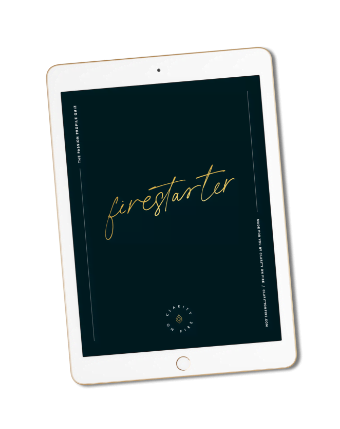Click the play button below, or subscribe and listen through our podcast on iTunes, Stitcher, or Google Play.
Podcast: Play in new window | Download
One of my clients has a passion and expertise for parrots (yet another reason I love coaching — you meet people with incredibly diverse interests).
The other day, we were talking about her desire to educate people with pet parrots about how to properly care for them, when she started dropping some facts that made me go, “Wait, hold up. Say that again.”
Here’s what she told me:
“Parrots are highly sociable animals programmed to live in a group. They’re also meant to fly dozens of miles a day (some species, like Macaws, fly up to 100 miles a day). They spend an enormous amount of physical energy doing this, as well as emotional energy in search of food, foraging, finding appropriate nest sites, and building and carving out those nests, as well as the energy it takes to raise young. They have voices meant to be heard up to 3 miles away so they can keep in constant contact with their flock.
Then humans put them in a cage, left alone and fed an inappropriate diet. They’re devoid of those things they are meant to do and eat, and oftentimes they suffer psychological and physical issues — like obsessively walking in circles, self-harming, and obesity — because of it.”
It’s obvious to us that birds aren’t meant to live in cages. And I bet as you read that, it made sense to you why a creature that’s meant to fly free might suffer when forced into a life that isn’t natural.
I’m guessing you weren’t like, “What’s wrong with you?! Suck it up, you dumb bird! You’re being overly dramatic. Your life is fine. This is just how it is.” Like me, you probably felt a pang of sadness and empathy for them.
But clearly our empathy doesn’t extend to ourselves. Because the thing that fascinates me most about these facts is how much they remind me of the human experience.
OUR BRAINS ARE SUPER OLD
Anthropologists agree that, even if you’re being very conservative in your estimation, the modern human brain originated at least 40,000 years ago, if not 70,000 or more years ago.
Pause and consider that for a moment. The organ that makes you you — that controls all other functions in your body — has no idea that it’s not, say, 10,000 BCE right now.
And exactly how similar is your life today to what it would have resembled tens of thousands of years ago? Off the top of my head, I’m seeing some glaring differences:
- Most of us work indoors for the vast majority of the day, with little access to natural sunlight.
- We don’t move nearly enough. There once wouldn’t have been a need to exercise, because our whole existence would have been exercise in and of itself!
- Our food is often highly processed and void of proper nutrition.
- We’re constantly exposed to unnatural chemicals and toxins (pesticides, cleaning products, fume emissions, plastics, heavy metals, etc.).
- Our sleep doesn’t always follow natural rhythms.
- We’re constantly connected to devices that are designed to be addictive.
- We’re exposed to far more information in a day than our brains are capable of processing.
- We’re expected to work long hours and find a way to fit the rest of our lives — including family time, exercise, and enjoyable hobbies — into the margins.
Another big one that stands out to me is the size of the groups we used to live in thousands of years ago, which maxed out around 150 people.
In a community that size, it would have been far easier for you to feel purposeful, because everyone would have a unique role to fill: “He’s the best hunter,” “She’s the go-to basket weaver,” “He carves beautiful figurines,” “She can heal anyone with her herbs.”
There’s a pride and an innate sense of fulfillment in being really useful and necessary to your community.
But now, thanks to the Internet and social media, the groups we’re exposed to are infinitely larger. And in that context, it’s easy to feel replaceable, like your contribution doesn’t matter that much.
STOP RAGGING ON MODERN LIFE, RACHEL
I know, I know. I’m elderly on the inside (you know you’re ancient when your version of “back in my day” was 10,000 years ago). You’d also have a point if you doubted my ability to survive in those times — though I contend I could have made an excellent shaman or chef (“Dude, her wooly mammoth steaks are off the charts!”).
I’m not denying the marvels of modern life. Clearly our lifespan is a LOT longer than it was 40,000 years ago, so not everything is bad. I’m grateful for surgeons and dentistry and running water and the wide availability of food, for starters.
But I don’t think the “pros” of modern amenities have canceled out the “cons.” There’s no doubt we’ve deviated pretty far from how we were designed to live, and I think (like those aforementioned parrots) we’re suffering over it.
The reason I wanted to write about this is because I talk to SO many people who share common complaints:
They’re tired, burnt out, and sad. They’re anxious, depressed, and lacking in purpose. They’re suffering from chronic illnesses. They don’t have enough time to themselves. They sit too much. They don’t see their family as much as they’d like. They hardly spend time outdoors. They’re overworked and underappreciated.
But their reaction to their situation is what I find most interesting, and disconcerting. It usually sounds something like:
“What’s wrong with me? Why can’t I shake this? Why am I so unmotivated? I must be broken, because I feel so anxious and depressed. Why is it so hard for me to feel fulfilled? What’s wrong with me, what’s wrong with me, what’s wrong with me?”
I have a hard time believing that the parrots believe anything is “wrong” with them.
As in, they’re not beating themselves up for not feeling energetic, motivated, or happy. Their first thought is not to assume that they’re “broken.” (And yeah, I get that parrots aren’t having long internal monologues, but go with it please.)
DON’T TAKE CREDIT FOR EVERYTHING THAT SUCKS
I cannot tell you how many times I have admonished clients for this over the years. It’s an epidemic! But I’ll do it to you, too:
Your first assumption should NEVER be that there’s something inherently “wrong” or “broken” about you.
It’s WAY more likely that the way you’re feeling is a natural symptom of you trying to adapt to an environment or routine that isn’t right for you.
Does changing that perspective automatically fix the “wrongness” of your situation? No. But it DOES allow you to release shame and guilt, and makes it easier for you to find self-acceptance. If anyone in your shoes might feel that way, not just you, then it isn’t a deeply personal problem.
It also allows you to stop focusing internally (“What’s wrong with me? Why can’t I fix myself?”) and start focusing on outward solutions, like, “How can I find a job that allows me more flexibility? How can I change my diet to make me feel better? When can I get outside and move my body? How much should I limit my social media scrolling today?”
When you believe the “wrongness” you feel is about YOU, there’s very little you can do to change it. It just feels like a built-in feature — something that was with you at birth.
But when you don’t jump to that conclusion, you’re far freer. You go from believing, “I’m messed up, at my core” to “I’m whole and good enough, AND there’s something about my situation that clearly isn’t working for me. Let me get to the bottom of it.”
Be empathetic with yourself. You might be feeling as caged as any bird in captivity. The big difference, of course, is that you have a lot more power to set yourself free.
So, in what ways have you been assuming the “wrongness” in your life was about you … when it probably isn’t at all? Come share with me in the comments below!
Much Love,
Rachel (& Kristen)
IF YOU LIKED THIS, YOU’LL ALSO LOVE…
What to do when you can’t focus and feel constantly distracted
How to make your own Rules for Sane Living
Breaking your phone addiction with Kristen Kalp
How to work like a woman (in a world that doesn’t want you to)



This hit home for me! I blame myself for my bad habits and then continue to live there because I’m sad and those habits are easy. I love the thought of changing mindset to practical ways I can feel better instead of assuming I’m just broken. You guys are the best!
I’m really glad this resonated with you, Sara! I just don’t think it ever pays off to assume we’re broken, and that’s that. I’m happy you agree! 🙂
Omg I can so relate. I have anxiety and depression and constantly beat myself up for not being happy. I still live with my parents which can be a challenge emotionally and my boyfriend and I are on a break. I’m a poor student which really doesn’t help with the self esteem…not sure if I’m headed in the right direction. So these are my circumstances, pretty hard to change without any money I must say
Hey Hanna,
It’s very understandable that you’re feeling emotionally challenged! I think any of us in your shoes likely would feel the same way. And you’re right, it can be hard when you don’t have the financial freedom to make big, sweeping changes in your life. That said, I think the seed I hoped to plant with this blog is that, before we change anything else, we’ve got to be willing to change our mindset about ourselves. Because as long as we identify as “wrong” or “off” or “broken,” it’s hard for us to have the hope that things can be better, or the energy to act accordingly. So right now, if all you did was give yourself permission to be understanding and empathetic with yourself, rather than berate yourself for not being happy, that alone would be huge progress, and would open up the door to a bigger domino effect of change.